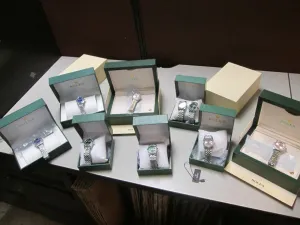CHICAGO– On June 4, at Chicago O’Hare’s International Mail Facility, U.S. Customs and Border Protection (CBP) officers inspected a shipment manifested as ‘Fashion Sunglasses’ and found a lot more than pairs of glasses. The shipment instead contained sunglasses as well as designer socks and luxury brand watches, all deemed to be inauthentic and bearing counterfeit marks, by CBP’s Centers of Excellence and Expertise, the agency’s trade experts.
CBP officers examined the shipment to determine the admissibility of the goods and found 36 pairs of designer sunglasses bearing counterfeit trademarks of designers like Louis Vuitton, Versace, Chanel, and others. Officers also found 25 pairs of socks bearing counterfeit Gucci, Hermes, Louis Vuitton, and Dior trademarks.
Sunglasses and socks were not the only thing officers seized. Officers intercepted 22 watches bearing the counterfeit trademarks of Franck Muller, Patek Phillipe, Adidas, and Rolex. The shipment was arriving from Thailand and was heading to a residence in Bedford, Indiana. The merchandise would have been worth a total of almost $638,000, Manufacturer’s Suggested Retail Price, had the goods been genuine.
“CBP protects honest trade and hardworking businesses,” said LaFonda D. Sutton-Burke, Director, Field Operations, Chicago Field Office. “Counterfeit goods defraud consumers and businesses. Our officers are dedicated to the CBP mission and work diligently for American consumers by stopping the flow of illegitimate and pirated merchandise.”
The rapid growth of e-commerce enables consumers to search for and easily purchase millions of products through online vendors, but this easy access gives counterfeit and pirated goods more ways to enter the U.S. economy. U.S. consumers spend more than $100 billion every year on intellectual property rights infringing goods, falling victim to approximately 20% of the counterfeits illegally sold worldwide. Counterfeit costume jewelry bearing famous brands such as Chanel, have been found to contain lead and other toxic materials which are dangerous to human health.
“Counterfeiters easily hide in plain sight on online marketplaces. They dupe shoppers into buying low quality and dangerous counterfeits online,” said Michael Pfeiffer, Chicago’s Acting Area Port Director. “CBP employees work tirelessly to protect our economy and consumers every day.”
CBP has established an educational initiative to raise consumer awareness about the consequences and dangers associated with purchasing counterfeit and pirated goods online or in stores. More information about this initiative is available at www.cbp.gov/fakegoodsrealdangers. To report suspected counterfeits, visit CBP’s online e-Allegations portal or call 1-800-BE-ALERT.
Brand owners wishing to partner with CBP to prevent the importation of counterfeit and substandard goods should visit https://iprr.cbp.gov/s/ for information about the e-Recordation program.
For more ways to protect yourself from counterfeit and pirated goods, visit https://www.stopfakes.gov/.
Follow CBP on Twitter @CBPChicago and @DFOChicago.


